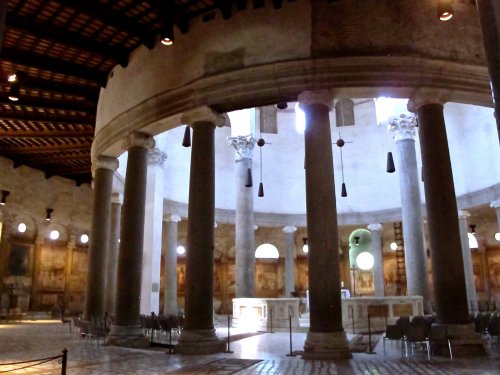The Eternal City and Eternity
When Shelley was in Byron’s company, he seemed to stop writing. Why? We can only speculate, but I think it’s partly because Byron’s larger-than-life persona and success as a published poet made Shelley feel small. That collapse into one’s self is not conducive to imaginative flights of fancy and surrendering to the creative spirit.
I’m using that as an analogy for what Rome has done to me and to explain my lack of productivity while here in the Eternal City.
For those of you who are friends on Facebook or follow me on Twitter (@rmfaris), you’ll know that I’ve been in Italy since late May. The first four weeks of my time here was as a registered student in LS 819 – “Landscape, Politics, and Poetry: English Romantics in Italy”, a travel study course offered by Simon Fraser University’s (SFU) Graduate Liberal Studies (GLS) Department. Our reading list included Rousseau, Goethe, and biographies of the poets, but the main focus was the work of Byron and Shelley.
We followed in the footsteps of these two poets, who spent their last years in Italy, by visiting cities they had lived in and enjoyed such as Venice, Florence, Pisa, Bagni de Lucca, Ravenna, and — of course — Rome where our course ended. We also veered off the path to visit cities such as Orvieto, Arezzo, and Assisi as well as many other wonderful Tuscan and Umbrian destinations.
While my colleagues in this adventure have returned home, I lingered in Rome and have now transitioned into summer holidays. I’ll be joined by family members tomorrow and we’ll be spending more time exploring this part of the world.

Rome is brash, bold, loud, chaotic, teeming with tourists, densely populated, hotter than Hades, ancient, new, crumbling, emergent, fascinating, intimidating, layered, in your face, colourful, irreverent, faith-based, and intriguing.
Being here brings you face-to-face, more so than in Vancouver, with issues of faith and belief. This connects to one of the themes which has occupied my interest since becoming a GLS student in 2010. Because the GLS program is largely focused on Western Civilization, you cannot avoid dealing with faith, religion, and particularly the Roman Catholic church because of the dominant position the Church has held in the evolution of the West – culturally, artistically, politically, and socially.
My studies, interestingly enough, have led me towards a greater tolerance and emerging personal understanding of religion and the positive aspects it may offer to believers. I still feel conflicted though because I cannot accept the point at which religion devolves into an exclusionary ideology of “I have the answer, I am right, you don’t believe as I do, therefore you are wrong and evil” which I believe underlies the negative consequences of the implementation and practice of religion through the ages.
In Rome, religion is everywhere you look, it is embedded – I believe – in the very DNA of the city and its citizens. And while I may feel awed stepping into the hushed cavern of yet another spectacular building dedicated to celebrating this faith, I feel bewildered at policies which in this modern age demand celibacy of its “managers”, sanction against contraceptives, and demonize homosexuality.
And while I embrace complexity in life, I wish the path to understanding eternity in the Eternal City was not so convoluted and confusing.